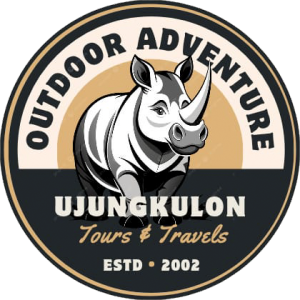
© Ko Hon Chiu Vincent
Ujung Kulon National Park is located on the extreme southwestern tip of Java Island, on the Sunda Shelf, in Banten Province. This protected area includes the Ujung Kulon Peninsula, several offshore islands, and the Krakatoa Nature Reserve. It holds exceptional geological interest, particularly for studies of inland volcanoes, and is renowned for its breathtaking natural beauty. The park also preserves the largest remaining area of lowland rainforest on the Java Plain.
Covering a total area of 1,056.95 km² (408.09 sq mi)—with 443.37 km² (171.19 sq mi) being marine—the park is a crucial refuge for numerous endangered species. It is the last natural habitat of the critically endangered Javan rhinoceros (Rhinoceros sondaicus), a species found nowhere else in the world. Other notable wildlife includes leopards, wild dogs (dholes), leopard cats, fishing cats, Javan mongooses, and several species of civets.
The park is also home to three endemic primates: the Javan gibbon, the Javan leaf monkey, and the silvered leaf monkey. More than 270 species of birds have been recorded, along with a variety of reptiles and amphibians, including two species of python, two types of crocodiles, and numerous frogs and toads.
Recognized as a UNESCO World Heritage Site, Ujung Kulon is under the joint protection of the Indonesian Government through the Ministry of Environment and Forestry and international conservation bodies. Its importance extends beyond biodiversity—it is a critical site for environmental education, ecological research, and sustainable tourism.
Conservation and Responsible Tourism
PT Ujung Kulon Tour and Travel, in collaboration with various stakeholders, is dedicated to promoting sustainable development that balances environmental conservation with community welfare. We are fully committed to conducting tourism activities with the utmost care and responsibility, particularly within Ujung Kulon National Park and its surrounding areas. Our efforts aim to protect not only the natural environment but also the cultural heritage of local communities.
Every tour and program we organize is designed to minimize environmental impact, support local livelihoods, and raise awareness of the need to preserve the unique ecosystems of Ujung Kulon for future generations.
